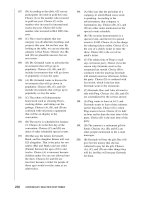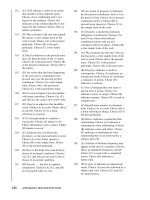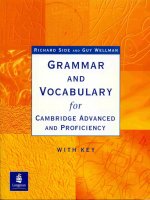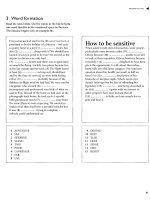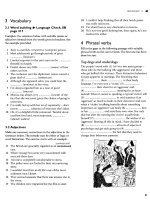New grammar practice part 1 pptx
Bạn đang xem bản rút gọn của tài liệu. Xem và tải ngay bản đầy đủ của tài liệu tại đây (160.44 KB, 10 trang )
Pearson Education Limited
Edinburgh Gate, Harlow
Essex,
CM20 2JE, England
And Associated Companies throughout the World.
www.longman.com
© Pearson Education Limited 2000
The right of Elaine Walker and Steve Elsworth to be
identified as authors of this Work has been asserted by
them in accordance with the Copyright, Designs and
Patents Act 1988.
AH rights reserved; no part of this publication may be
reproduced, stored in a retrieval system, or transmitted
in any form or by any means, electronic, mechanical,
photocopying, recording, or otherwise without the prior
written permission of the Publishers.
ISBN 0 582 41710 4
Fifth impression 2004
Set in Slimbach
Printed in Malaysia, LSP
Illustrations by David Mostyn
Project Managed by Lewis Lansford
Additional material written by David Bowker.
Contents
To the student
NOUNS, ADJECTIVES AND ADVERBS
pronouns 1 -2
possessives 2-5
plurals 7
the article 8-16
countables and uncountables 6,15,17-19
comparative and superlative
adjectives 20-25
participial adjectives 26-27
adverbs 27-29
VERBS
The present tense
present simple and continuous 30-37
The past tense
past simple and continuous 38-48
present perfect 48-56
The future tense
present continuous as future 56-58
going to future 58-60
63-65
future simple 61-66
present simple as future 65-66
Verb formations
irregular verbs 67-70
The passive
passives 71-74
Verb formations
used to 75-77
imperative 77-78
CONDITIONALS
first conditional 79-80
second conditional 81-82
zero conditional 84-85
MODALS
modals in questions and negatives 86-87
can, could 87-88
may, might 89-90
should, must 91-92
have to 93-95
GERUNDS AND INFINITIVES
The gerund 96-100
The infinitive 101-104
REPORTED SPEECH
Direct speech 105-110
Indirect speech 111-114
SENTENCE STRUCTURE
Word order
direct and indirect object 115-116
frequency adverbs 117-118
link words 118-120
Questions and answers
making questions 121-123
short responses 124-125
Relative clauses 126-127
PREPOSITIONS 128-137
PHRASAL VERBS 138-144
TESTS 1-3 145-153
ANSWER KEY 154-168
INDEX 169-174
To the student
Grammar Practice for Pre-Intermediate Students gives short, clear explanations
of all the main areas of English grammar, and provides practice exercises for
you to do.
There are two ways in which this book can he used:
(i) in class with help from your teacher;
(ii) at home by yourself.
If you are using the book by yourself, use the Index and the Contents list to find
the area that you want to study, read the grammatical explanation, and then do
the exercise. To check your answers, you will need to use the edition of
Grammar Practice for Pre-Intermediate Students with Answer key.
We hope that Grammar Practice for Pre-Intermediate Students helps you to
improve your English.
Elaine Walker
Steve Elsworth
Nouns, adjectives and adverbs
1 Subject and object pronouns
Subject pronouns
I you he she it we you they
Object pronouns
me you him her it us you them
• The subject is the person or thing doing the action:
/ left early.
She went home.
We said goodbye.
• The object is the person or thing
receiving the action:
She telephoned me.
I hit him.
We saw her.
Practice
Write the correct pronouns for these sentences.
1 She telephoned yesterday, (she)
2 We watched .him for hours, (he)
3 Hasn't arrived yet? (she)
4 don't understand. (I)
5 Are you talking to ? (I)
6 Don't ask doesn't know, (she/she)
7 This is Julia: have known for years, (we/she)
8 Nobody told the bus was leaving, (they)
9 Why didn't ask to come? (she/they)
10 Don't ask Ask (I/he)
11 think doesn't like (T/hc/I)
12 asked to invite (they/he/we)
1
Nouns, adjectives and adverbs
2 Reflexive pronouns
myself yourself himself herself itself
ourselves yourselves themselves
• The object is the same person or thing as the subject:
1 cut myself when I was cooking.
The kettle will switch itself off automatically.
Practice
Write the correct reflexive pronouns for these sentences.
1 I like to wake myselff up in the morning with a cup of coffee.
2 Thanks for a great party - we really enjoyed . ourselves .
3 I hate watching on video.
4 I'm sorry, Tony, but I haven't got enough money to pay for you. Can you
pay for ?
5 After his accident, Philip drove to the hospital.
6 We don't need a babysitter - the children can look after
7 Now, children, remember to give enough time to
answer all the exam questions.
8 'Should I apply for the job?' she asked
9 We're planning to buy a new television.
10 He hurt when he was playing football.
3 Possessive adjectives
• Each pronoun has a possessive adjective:
I —> my we —> our
you —> your you —> your
he —> his they > their
she —• her it —> its
Practice
Write the correct possessive adjectives for these sentences.
1 These are my parents. (!)
2 I've got watch, (he)
3 Is this car? {you)
4 Do they like new house? (she)
2
Nouns, adjectives and adverbs
5 Have you met teacher? (they)
6 Who's got money? (I)
7 I don't like teacher, (we)
8 Have you got passport? (you)
9 He forgot keys, (he)
10 They changed hotel, (they)
11 She gave the letter to secretary, (she)
12 There's something wrong with car. (I)
13 They're having a party in garden, (they)
14 Where's pen? (I)
15 I like jacket. (You)
4 Possessive adjectives and pronouns
Possessive adjectives
my your his her its our your their
Possessive pronouns
mine yours his hers - ours yours theirs
• The possessive adjective is always followed by its noun:
It's my car.
That's his mother.
This is our house.
• The possessive pronoun is never followed by its noun:
This is mine.
Give it to Peter: it's his.
The money is ours.
Practice
Write the correct possessive adjective or pronoun for these sentences.
1 Whose camera is this? Is it yours. ? (you)
2 Excuse me, those are ,.our seats, (we)
3 Is it suitcase or ? (you/he)
4 Has the dog had food? (it)
5 They're not keys - they're (I/she)
6 I don't think its room: I think it's (you/they)
7 The police asked me for address. (I)
3
Nouns, adjectives and adverbs
8 Have you got pen, or would you like to borrow
? (you/I)
9 garden is bigger than (they/we)
10 I think this is book. Oh no, it's (I/you)
11 The decision is (they)
12 The cat wants dinner, (it)
13 You know it's not money. It's (you/I)
14 It isn't car, it's (he/she)
15 It wasn't mistake, it was (I/they)
16 Have you met mother? (they)
17 parents say the decision is (she/they)
18 brother hasn't got a phone, so he uses (I/we)
19 car wasn't working, so I used (I/he)
20 house is smaller than (we/they)
5 The possessive with s
• To indicate possession for people or animals:
a) in the singular, add 's:
Anne's bike
James's friend
The dog's food
b) for plurals ending in s, just add ':
The boys' mother
My pare/Us' house
The ladies' hats
c) for other plurals, add 's:
The children's friends
The women's cars
Note: It's = It is. The possessive of it is its:
It's cold today.
Give the dog its food.
Practice
Rewrite these sentences, putting the apostrophe (') where necessary. If two
answers are possible, write the more likely one.
1 We talked to the boys parents for some time.
We talked to the boys' parents for some time.
We talked to the boy's parents for some time.
2 We can borrow my fathers car.
We can borrow my father's car.
3 Have you met Susans friend?
4 About sixty people use the teachers room.
5 Someone had taken Barbaras purse.
6 Something was hurting the animals foot.
7 I'm going to write to the childrens parents.
8 Jane works in my mothers office.
9 The dog doesn't like its food.
10 Mary and Pat stayed at their friends house.
11 Are you going to the secretaries meeting?
12 I put the money in the waiters hand.
13 lans suit was very expensive.
